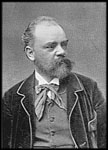
DoveSong.Com
|
|
Antonín
Dvorák (1841-1904)
|
This Czech composer wrote a number of beautiful compositions. He was born in
Bohemia on September 8, 1841. He was the son of an
inn-keeper who wanted him to be a butcher. But Dvorák
learned the violin from his schoolmaster and then earned
his livelihood as a violinist in a small orchestra until
he became a viola player with the National Theater. When
he was 33, he wrote a hymn for male chorus and |

|
orchestra.
This work attracted so much attention that he began
receiving a government stipend. He later moved to Prague
where he died on May 1, 1904.
Dvorak wrote some beautiful and
important works. In 1892 he visited America where he was
fascinated by native American culture. In New York, he
heard the singing of negro spirituals, then called slave
melodies. He told the New York Herald in May 1893 that
they were the necessary foundation for the future music of
the country.
"In the slave melodies of
America I discover all that is needed for a great and
noble school of music. They are pathetic, tender,
passionate, melancholy, solemn, religius, bold, merry, gay
or what you will. It is music that suits itself to any
mood or any purpose. There is nothing in the whole range
of compoition that cannot be supplied with themes from
this source." And he was the first to follow this
advice when on December 16, 1893 his New World symphony
was premiered at the Carnegie Music Hall. |
Selected Compositions on CD
The New World
Symphony
Cello
Concerto
The
American String Quartet
Web Sites
A
Dvorak Web Site
|
|
|
|

